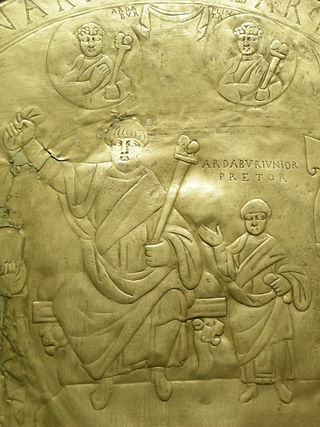Top Qs
Timeline
Chat
Perspective
Plinta
Roman general From Wikipedia, the free encyclopedia
Remove ads
Flavius Plinta (fl. 418–438) was a Gothic politician and general of the Eastern Roman Empire. He held the title comes, and then became consul and magister militum praesentialis.

Remove ads
Biography
Summarize
Perspective
In 418, as comes, he suppressed a revolt in Palestine, and it was perhaps in view of this success that the following year, in 419, he was promoted to consul posterior, concurrently with Monaxius, and Magister militum praesentialis.[1] According to Sozomen, he was one of the most powerful figures at the court of Theodosius II.[2]
Plinta was a Goth. He was related to Aspar (CIL XI, 2637), likely as his father-in-law, and father of Armatius. In 450 his daughter was given in marriage by Theodosius II to Constantius, the secretary of Attila. Plinta was an Arian of the sect of Psatirians (the followers of Marinus of Thrace), who, in Constantinople in 419, rejoined the other Arians.
In 431 he tried, unsuccessfully, to place Saturninus on the episcopal throne of Marcianopolis in place of the Nestorian Dorotheus. In 432 he advised the Bishop of Antioch, John, to accept the mediation of Theodosius II and to reconcile with the Patriarch of Alexandria, Cyril. Between 435 and 440 he asked the emperor to send him as ambassador, along with Flavius Dionysius, to Rugila, the King of the Huns. After Rugila died, Plinta and Epigenes were sent to his successor, Attila, with whom they negotiated and concluded the Treaty of Margus or the Peace of Horreum Margi.[3]
Remove ads
Notes
Bibliography
Wikiwand - on
Seamless Wikipedia browsing. On steroids.
Remove ads
